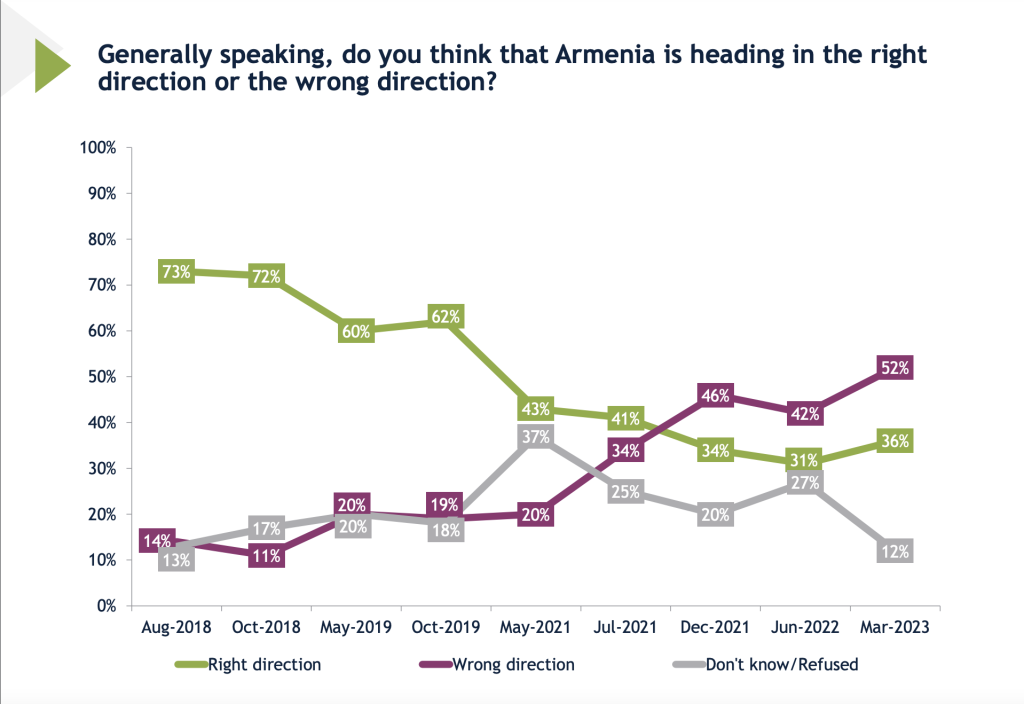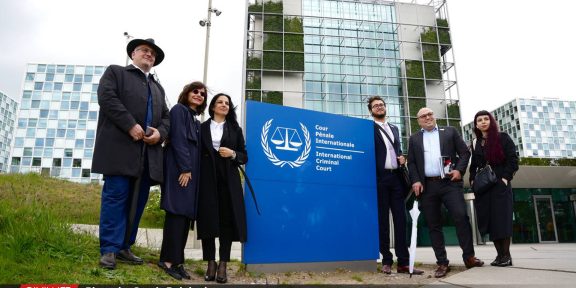By Mark Dovich
A new public opinion survey shows growing pessimism in Armenia about the country’s political class and foreign policy direction, particularly with regard to the Nagorno-Karabakh conflict.
Overall, a majority of respondents said they felt Armenia was heading in the wrong direction and that they would describe the prevailing mood in the country as either “insecurity, worry, fear for the future” or “total disappointment, disbelief in any improvement.” The 52% share answering “wrong direction” was the highest recorded in IRI surveys since at least August 2018.

When prompted to identify the main problems facing Armenia, three in five respondents selected “national security and border issues.” In contrast, most of those polled focused on economic issues like unemployment to describe the most pressing issues facing their communities or households.
Declining public trust in government
Most Armenians have little faith in their elected representatives’ ability to tackle those problems, the survey suggests. Nearly two-thirds of the respondents said there were no politicians or public figures they trusted. Only 14% said they trusted Prime Minister Nikol Pashinyan.
Moreover, 43% of respondents said Pashinyan’s government had not achieved a single success in the past six months. The most popular responses to the question of his administration’s biggest failure in that time concerned the Nagorno-Karabakh conflict and regional security issues.
Separately, nearly seven in ten respondents said they felt the Armenian government’s Nagorno-Karabakh policy has “regressed” in the past half year. For comparison, only 18% of those polled gave that answer in May 2019.

When asked which party they would support if elections were held now, a plurality of those polled — 30% — said they would not vote at all, with another 12% saying they would spoil their ballot. Nonetheless, Pashinyan’s Civil Contract remains the most popular party in Armenia, attracting the backing of 21% of respondents. No other party registered more than 5% support.
Public trust also appears to be declining in most of Armenia’s key institutions. A majority of respondents reported satisfaction with only three of 17 bodies included in the poll: the police, the church, and local government. At the same time, the survey shows rising dissatisfaction with Pashinyan and the military in particular.
Armenians name friends and foes
Turning to foreign relations, large majorities of respondents favorably evaluated Armenia’s relations with France, the United States, the European Union, and China, as well as with neighboring Iran and Georgia. Conversely, most of those polled negatively assessed Armenia’s relations with Azerbaijan and Turkey.
Strikingly, public opinion on Russia appears to be growing increasingly unfavorable, with respondents split nearly evenly on calling Armenia’s current relations with Russia “good” or “bad.” For comparison, more than nine in ten people positively evaluated the two countries’ relationship in October 2019.
Nonetheless, majorities of respondents still recognized Russia as one of Armenia’s most important political, economic, and security partners on the world stage.

The survey, organized by the Washington-based International Republican Institute, was conducted in Armenia from late January to early March. It has a margin of error of plus or minus 2.5 percentage points.
















